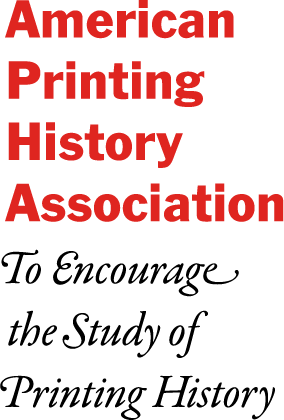Chesapeake Chapter / June 22, 2015 / a guided tour of “First Among Many: The Bay Psalm Book and Early Moments in American Printing” at the Library of Congress
See photos of our gathering below the text.
An exhibition at the Library of Congress told the story of early printing in the American colonies, spanning 100 years, as printing evolved from a colonial necessity to the clarion of freedom.
Mark Dimunation, Chief of the Rare Books and Special Collections Division gave a special tour of the exhibit for APHA Chesapeake Chapter members.
At the centerpiece of the exhibition was two copies of the Bay Psalm Book, officially titled “The Whole Booke of Psalmes Faithfully Translated into English Metre” (1640). One copy was drawn from the Rare Book and Special Collections Division at the Library of Congress. The second copy, which belongs to David Rubenstein, was also on display so we got to see the book in both the original (LoC) and in a more recent binding. It is the first time the books have been seen together. Both copies were at one time in the library of the Rev. Thomas Prince and, therefore, originally part of the historic Old South Church Library in Boston.
Librarian of Congress James H. Billington said, “The Library is extremely grateful to David Rubenstein for sharing his extraordinary copy of the Bay Psalm Book. The celebration of this book is the impetus for the Library’s exhibition. The Bay Psalm Book is a book of many firsts—the first English-language book in North America, the first book of American poetry, and the first instance in a long and vital history of printing in America.” Rubenstein said, “I appreciate the hard work of Jim Billington and the Library of Congress professionals in organizing this exhibition. I hope those interested in our nation’s early history will take the time to see this unique assemblage of American treasures.”
Approximately 30 additional Library of Congress treasures were on display, including the Dunlap Broadside of the Declaration of Independence (1776); “Poor Richard’s Almanac” by Benjamin Franklin (1741 and 1742); “Common Sense” by Thomas Paine (1776); “The Federalist,” essays by Alexander Hamilton, James Madison and John Jay (1788); “Poems on Various Subjects, Religious and Moral” by Phillis Wheatley (1773); “The Power of Sympathy,” the first novel printed in the colonies (1789); samples of colonial newspapers from Boston, New York, Philadelphia and Williamsburg, Virginia; and the Algonquian Indian Bible, translation by John Eliot (1663).
In the exhibition, The Bay Psalm Book could be seen as launching an approach to publication that was particular to colonial America. Early American printing often was rugged, immediate and practical, fueled by a sense of purpose and devotion. Publications—sermons, pamphlets, newspapers, broadsides—gave shape to the American cause and ideology.
Printing was brought to English North America in 1638. Stephen Daye, a locksmith by training, was under contract to establish a press in North America upon his arrival. In 1640, less than two years after landing in Massachusetts Bay, Daye and his son Matthew printed “The Whole Booke of Psalmes Faithfully Translated into English Metre,” the first book printed in what is now the United States. The Bay Psalm Book emerged as the first among many landmark American printings—materials that registered American thought, devotion and revolution. Only 11 copies of The Bay Psalm Book from 1640 are known to exist today.
An excellent way to spend the day.
Above: The two copies of the Bay Psalm Books. The left is from the LoC collection and is in its original binding.
Above: In case you haven’t received the notification the atrium area of the Library of Congress has been officially named as the Chesapeake Chapter Clubhouse. Mark Dimunation has been appointed as Sargent of Arms.
Above: Mark Dimunation addressing our group (which slowly collected more and more hanger-oners) telling us about the the two copies, ending with the line “Just because I can.”
Above: Mark looks like a first-time father looking into the hospital nursery.
Above: a few of our members.
Above: The two versions of the Declaration of Independence.
Above: The photographer being from Delaware thought this was a vercool imaging showing the states falling into line.
Above: Some nice letterpress impression.
Above: This photo of Ray Nichols standing in front of an image of a printer using ink balls on a common press is in celebration of Lead Graffiti getting their two iron handpresses up and running. To take a line out of many of Mark Dimunation’s talks, “Just because I can.”
















